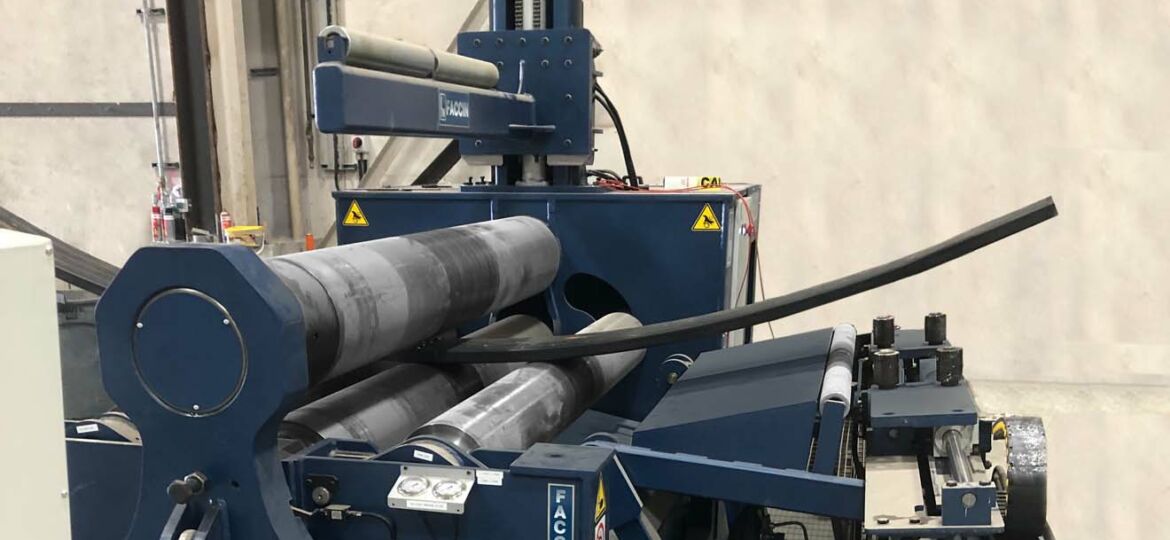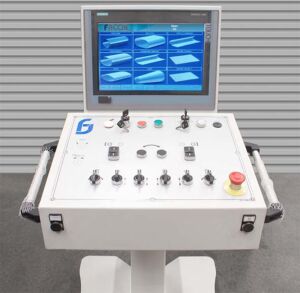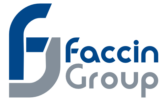
When you are a world leader in microtunnelling, you know a thing or two about the equipment needed to operate efficiently. And when Ward & Burke, an Ireland-based civil engineering firm, expanded its Canadian operations, it made sense that it would look at adding familiar machines.
“We have about 200 employees across our shop facilities in Newmarket, Ont.; Calgary, Alta.; and Vancouver,” said Robert Ward, president, Ward & Burke. “We primarily deal with maintenance of heavy plant equipment and fabrication of tunnelling accessories. Right now we have welders, plasma cutters, punches, and all the usual sort of steel fabricating equipment you could expect in a facility our size.”
One of the things Ward & Burke strives for is quality. Tunnelling and shaft work can be very high risk as workers are constantly dealing with difficult ground conditions. All of its work is centred around long-distance underground tunnels, where a remote-controlled tunnelling machine moves from one shaft to another. The equipment needs to be able to manoeuvre across half a mile of rocks, boulders, water, and whatever it encounters without getting stuck. The tunnelling equipment does not have the ability to reverse, so it’s important that it is robust and capable of tunnelling through tough materials.
“We typically make around 200 shafts per year in North America, and every shaft we make has a rolled edge at the front of it, which is roughly 10 m in diameter,” said Ward. “All of these features need to be fabricated before ever going to the site. Basically, we fabricate in batches. Almost all of our components are circular, so we make all the forms, then the platforms that the workers need to walk on to build the shafts. In a batch, there’s typically a steel leading edge, former, and platform that need to be produced, and that can take upwards of several months.”
To do this successfully in-house, the shop needed a plate roller. It was important for the company to look for something that offered reliability, especially because of the nature of the work it was doing, and came with the backing of service and support to ensure that the machine could keep running for years to come.
“We had a Faccin roller at our Ireland location. We started with this machine and it offers the high accuracy we need and, for us, and it’s reliable,” said Ward. “I mean, it really lived up to our expectations and its reputation. This is why we wanted to have the same capabilities in our Newmarket, Calgary, and Ohio facilities. We basically wanted to replicate what we have in Ireland across our Canada and U.S. operations.”
A Canadian Partner
 Once the company decided to purchase a 4HEP 4-roll machine, it went straight to Faccin to see what the next steps were. Faccin put Ward in touch with Elliott Matsuura.
Once the company decided to purchase a 4HEP 4-roll machine, it went straight to Faccin to see what the next steps were. Faccin put Ward in touch with Elliott Matsuura.
“The company’s Newmarket facility was looking to bring all that processing in-house because they couldn’t find reliable suppliers to roll the materials that they needed,” said Michael Zlatar, Ontario regional sales manager – fabrication, Elliott Matsuura Canada, Oakville, Ont. “So, once we connected, the first step was a visit to the facility and a discussion with the plant manager on exactly what they needed. We reviewed some drawings with Ward & Burke and Faccin to get it right. And then we came up with a configuration of a 4HEP 4-roll plate bending machine that would basically cover all of their needs. We took it a step further and upgraded all of the software to make it a full CNC. So it’s a hundred per cent user-friendly and takes all the guesswork out. We did some demos and then it worked out really well.”
The Equipment
It was important for Ward & Burke to have a 4-roll machine, and the same model that’s used at its other facilities.
For options, the company preferred offline programming so it could preprogram all work orders. One of the advantages of this feature is that the machine is able to precalculate all specifications of the job, including the material size needed to make the necessary shape. On a fully CNC plate roller, once the material is inserted, the machine squares it up, performs the bending operations, and a finished part is ready to be taken out.
“We needed this machine for plate up to 4 in. for our rolling equipment,” said Ward. “One of the big strengths that the machine offers is its ability to open up to that plate thickness. Most machines on the market tend to be around 3 in., but we needed to roll 3.5-plus in. This machine can handle the 4-in.-wide steam channels we need to fabricate.”
And while the shop does a lot of work in the 4-in. plate range, it typically works with 1- to 2-in. plate. The smallest forms it makes are roughly 4 m in diameter and the largest is 30 m diameter for a shaft. The tunnels are typically 60 cm up to about 4.24 m. Every pipe for tunnelling with has a steel leading edge on it. A pipe is 3 to 4-m long, and a tunnel is 1,000 m and has 250 of these pipes.
“Each one of these pipes has a rolled steel leading edge that needs to be rolled expertly,” said Ward. “The accuracy we need in the diameter is ±2 mm, which is twice the thickness of a fingernail. So it’s fairly tight, especially if it’s 20 m across. That accuracy is very important. We use laser measurement to verify seven or eight locations on the circle and it can measure to 0.2 mm. All the rollers we buy are 4-point rollers, which offer better accuracy than a 3-point roll.”
One of the advantages of the software and state-of-the-art features is that Ward & Burke can worry less about the skill level of its operators. With older equipment, a skilled operator is needed to run the machine properly and effectively adjust all the variables and parameters on the equipment. Ward noted that sometimes these older machines required years of experience for operators to truly get it right all the time.
“Once the machine was installed, we needed to train our young workers to use it,” said Ward. “Sometimes this can take up to a year to really familiarize themselves with the machine. We basically hire all apprentices, so they have to learn how to use it from scratch. We had a Faccin representative come for a week and spend time training several of our employees on the machine. And now they can use it effectively.”
With labour shortages and retirements on the horizon, having a machine that is able to take all the guesswork out of plate rolling has been a huge benefit for the company.
“Its repeatability is 100 per cent, every time,” said Zlatar. “If you recall a program five months after first creating it, it will produce the same part that you did five months ago; it already knows what to do. You just put the plate in the rolls and just push a button.”
Future Opportunities
Every new city that the company works in requires a new set of tunnelling equipment, so that means the plate roller is constantly bending plate for new projects. Currently the shop is in the process of manufacturing tunnelling equipment for Calgary; Vancouver; Columbus, Ohio; and San Diego, Calif.
“Right now our Newmarket team is manufacturing this new equipment for San Diego, which should be ready in about six months,” said Ward. “We currently have quite a few competitors in this space but there is still quite a bit of work to be had. I think most of our future growth will be in the U.S. However, one thing about the West Coast, particularly Vancouver, is that no one is really doing any steel fabrication. Most companies buy from the U.S. West Coast, so we see that as an opportunity for growth.”
This growth has required the shop to look at adding more plate rollers. And in April of this year, Ward once again reached out to Elliott Matsuura. Ward was very happy with the 4HEP machine and wanted to purchase two more identical machines, which are set for delivery in December of this year.
If you want to know more of how the Faccin Group can help you with your rolling, bending and metal forming challenges, do not hesitate to contact us
ABOUT THE AUTHOR: Lindsay Luminoso – Associate Editor – Canadian Metalworking / Canadian Fabricating & Welding

